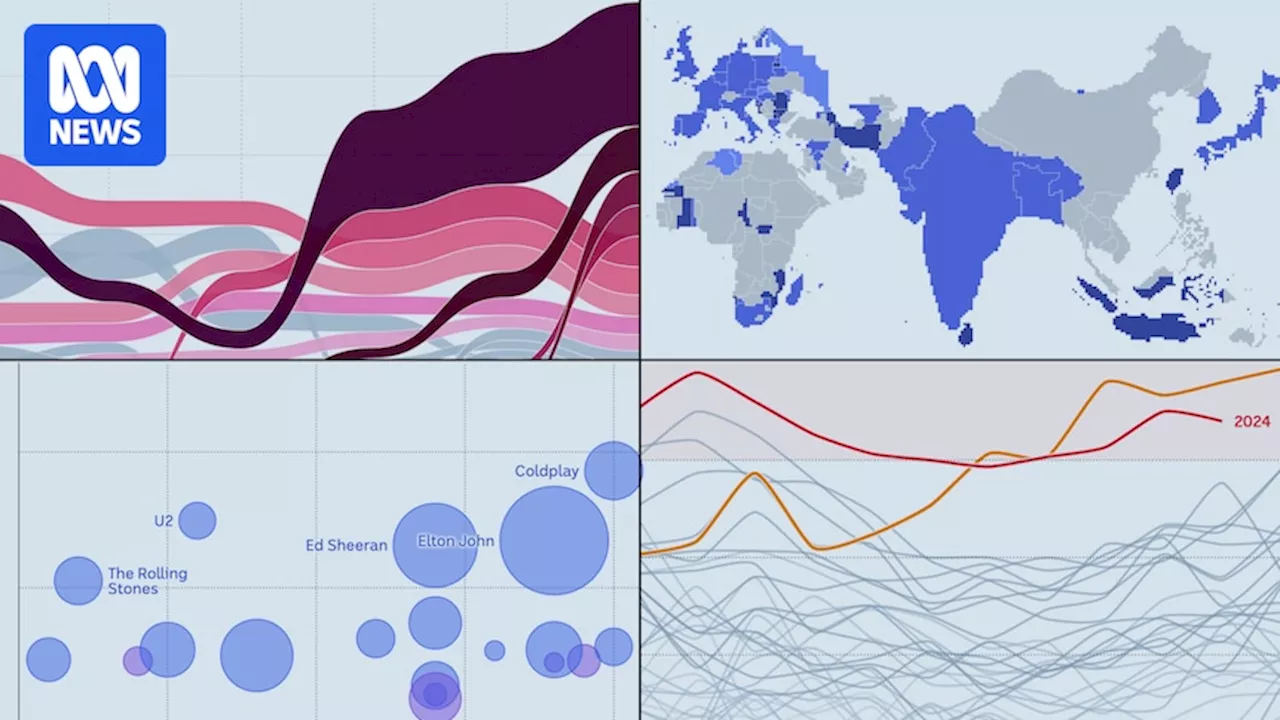Earth experienced its hottest year on record in 2024, exceeding the 1.5 degree Celsius warming threshold set by the Paris Agreement. The year was marked by extreme weather events including heatwaves, floods, and devastating storms. Scientists warn that these record-breaking temperatures are a sign of a rapidly changing climate and are urging immediate action to reduce greenhouse gas emissions.
The world has been at its hottest for the past 10 years, with 2024 now declared the official record-holder, according to data from the European Union's main climate service released today. It was also the first calendar year in which Earth exceeded 1.5 degree Celsius above pre-industrial levels, which is one of the targets world leaders agreed to limit warming to in the 2015 Paris Agreement .
It was a year in which floods gave way to heatwaves and devastating storms dominated the headlines, with several major climate milestones also reached.According to the Copernicus Climate Change Service (C3S), 2024 was 1.6C warmer than pre-industrial times, easily beating the previous record year of 2023. Climate Change Service deputy director Samantha Burgess said the world was now teetering on the edge of passing the threshold of global-warming defined in the 2015 Paris Agreement. 'These high global temperatures, coupled with record global atmospheric water vapour levels in 2024, meant unprecedented heatwaves and heavy rainfall events, causing misery for millions of people.' The 1.5C target was chosen because the Intergovernmental Panel on Climate Change (IPCC) indicates that crossing that threshold risks unleashing far more severe climate change impacts, including more frequent and severe droughts, heatwaves, rainfall, and coastal flooding from storm surges. Passing it for one calendar year does not mean we have failed the Paris Agreement, which refers to a longer-term change over the course of 20-30 years. Estimates from the latest IPCC report expect global warming to reach 1.5C between 2030 and 2052, though climate scientists say it’s likely to be earlier based on recent years of data.The Global Water Monitor report. The report's lead author, Professor Albert van Dijk, said the increase in daily rainfall extremes has been met with significant flash flooding events around the globe, including the devastating flooding in Spain in October.'We've had big floods in the south of Brazil, even though there was a drought going on in the north of Brazil, for instance. And we've had similar big floods in places like Bangladesh and associated with cyclones in South-East Asia, Vietnam, southern China, Philippines and so forth.'found the number of record-dry months was well up in 2024, compared to the average. This has become increasingly common in recent decades.The world is a big place, so there's going to be extreme weather in any given year. But Professor van Dijk said this year extreme weather events had gone 'from bad to worse', with severe flooding, hurricanes and droughts across all corners of the globe.Hurricane Milton produced 46 tornadoes and caused torrential rainfall and localised flooding. Milton's rate of rapid intensification was among the highest ever observed.. During the Atlantic hurricane season, two severe hurricanes, Helene and Milton, also hit Florida within two weeks of each other.People work to clear a mud-covered street with piled up cars in Paiporta, Spain. (Reuters: Eva Manez) A boy immerses himself in flood waters outside a home in the aftermath of Hurricane Beryl, in Rosenberg, Texas, in July 2024.A Muslim pilgrim pours water on his head to cool down from the heat, as he takes part in the annual hajj pilgrimage in Mina, Saudi Arabia, June 17, 2024. A man cools down during a heatwave at the annual Hajj pilgrimage in Mina, Saudi Arabia. (Reuters: Mohammed Torokman)A drone view shows an area affected by the floods in Encantado, Rio Grande do Sul state in Brazil in May 2024.A man throws an object while standing on a section of a bridge destroyed during the aftermath of tropical storm Sara, in La Ceiba, Honduras in November 2024.Khilona,50, a farm labourer, sleeps on a bed along with a handmade fan under a shed at her house during a heatwave in New Delhi, India, in May 2024. A farm labourer sleeps with a handmade fan during a heatwave in New Delhi, India. (Reuters: Anushree Fadnavis) People walk along flooded shrimp and crab farms due to heavy rain as Cyclone Remal passes the country in May 2024.A man covers his head with his bag as tourists visit the Parthenon temple atop the Acropolis hill archaeological site before it closes due to a heatwave hitting Athens, Greece, June 13, 2024.Fires forced mass evacuations in Alberta, Canada. (Reuters: Amber Bracken)Hurricane Helene made landfall on the Florida Gulf Coast in September. (Reuters: Eduardo Munoz)Flood damage following Hurricane Helene in Florida. (Reuters: Marco Bello) People use ropes to remove fallen trees following the impact of Typhoon Yagii, Hai Phong, Vietnam, September 8, 2024. REUTERS/Minh NguyenChildren play along a flooded street following super typhoon Man-Yi in the Philippines. (Reuters: Lisa Marie David) A drone view shows an airplane sitting on a flooded runway at the airport in Porto Alegre, Rio Grande do Sul, Brazil, May 17, 2024.A plane sitting on a flooded runway at the airport in Porto Alegre, Rio Grande do Sul, Brazil. (Reuters: Adriano Machado)CSIRO oceanographer Chris Chapman said although some of the ocean heat was expected due to the presence of El Niño, its persistence and intensity across other areas has gone well beyond what's normal.Though not specifically about 2024, we thought we'd include this graph from the World Meteorological Organisation, which shows some encouraging news.The number of deaths by natural disasters were compiled by the World Meteorological Organisation based on the based on Centre for Research on the Epidemiology of Disasters’ Emergency Events Database.Hot days and hot nights dominated much of the country this year in Australia, despite some severe cold snaps during the winter. This resulted in Australia coming away with its second hottest year on record, overall, since 1910, when reliable national data became available. Last year brought record heat to parts of Australia, including much of western WA and the central interior. Last year was also the 24th consecutive year the country failed to record a mean temperature cooler than normal. Although the overall temperature was just shy of a record, the overnight minimum temperatures were easily the highest in BOM's 115 years of data.Cyclones, heatwaves, fire and flooding — we've seen it all. In this six-part series, Tyne Logan explores what we have learned from Australia's extreme weather events and how to better prepare for the future.is now the most extensive on record, according to the National Oceanic and Atmospheric Administration's (NOAA) Coral Reef Watch. A staggering 78.9 per cent of the world's coral reef areas — from the Atlantic to the Pacific to the Indian oceans — have so far been subjected to bleaching-level heat stress. It included the seventh mass bleaching of the Great Barrier Reef since 1998, and fifth in eight years. Before: The Ribbon Reef, on the northern side of the Great Barrier Reef, before coral bleaching occurred.. . After: The Ribbon Reef after coral bleaching. Photos: George Roff. .The Ribbon Reef, on the northern side of the Great Barrier Reef, before coral bleaching occurred. / The Ribbon Reef after coral bleaching. Photos: George RoffLarge parts of the world had multiple days under strong heat stress in 2024, with some experiencing it for most of the year. This included parts of Australia.Antarctic sea-ice extent — both the annual minimum in February and the maximum in September — was the second lowest since satellite records began Unlike its Northern Hemisphere counterpart, Antarctic sea ice extent has historically not shown strong trends with global warming. However, Dr Chapman said the recent decline had sparked questions among scientists. 'We can't definitively say anything yet, you know, two or three years does not make a trend. But so far the sea ice hasn't rebounded and that's something that is keeping a few of us awake at night because it suggests that perhaps something has changed in the system.'The biggest contributor to our warming climate is greenhouse gas emissions from the burning of fossil fuels. To stop that trend, our emissions need to not only plateau but reduce.The world is headed for record installations of wind and solar in 2024, after a record year in 2023, according to the International Energy Agency. But it's still not quite enough to offset the growing demand for electricity, which is why global greenhouse gas emissions did not fall
Climate Change Global Warming Record Temperatures Extreme Weather Paris Agreement Greenhouse Gas Emissions
Australia Latest News, Australia Headlines
Similar News:You can also read news stories similar to this one that we have collected from other news sources.
 South Australia's class of 2024 celebrates record-breaking yearThe class of 2024 has finally had its year 12 results released.
South Australia's class of 2024 celebrates record-breaking yearThe class of 2024 has finally had its year 12 results released.
Read more »
 Why 2024 was a record-breaking year, according to the data2024 shook the world in more ways than one. From politics to pop culture, climate to conflict, 2024 was a year of tumbling records — but not always for the best reasons.
Why 2024 was a record-breaking year, according to the data2024 shook the world in more ways than one. From politics to pop culture, climate to conflict, 2024 was a year of tumbling records — but not always for the best reasons.
Read more »
 The top 10 hottest places on Earth in 2024Though parts of Australia are currently under a brutal summer heatwave, they're still far from some of the...
The top 10 hottest places on Earth in 2024Though parts of Australia are currently under a brutal summer heatwave, they're still far from some of the...
Read more »
 Few countries spared from fatal heat events in 2024 as dangerous heat days pile upA 13-month heat streak likely made 2024 the hottest year on record.
Few countries spared from fatal heat events in 2024 as dangerous heat days pile upA 13-month heat streak likely made 2024 the hottest year on record.
Read more »
 UN Declares Decade of Deadly Heat as 2024 Reaches Record TemperaturesThe UN has declared the past decade a period of unprecedented heat, with 2024 set to be the warmest year on record. This trend is driven by human activities and is exacerbating extreme weather events globally.
UN Declares Decade of Deadly Heat as 2024 Reaches Record TemperaturesThe UN has declared the past decade a period of unprecedented heat, with 2024 set to be the warmest year on record. This trend is driven by human activities and is exacerbating extreme weather events globally.
Read more »
 Tech Titans Lead 500 Richest to Record Wealth in 2024The world’s 500 richest people saw their wealth surge in 2024, led by Elon Musk, Mark Zuckerberg, and Jensen Huang. A strong rally in US technology stocks, fueled by Trump’s election victory, played a key role in boosting their fortunes.
Tech Titans Lead 500 Richest to Record Wealth in 2024The world’s 500 richest people saw their wealth surge in 2024, led by Elon Musk, Mark Zuckerberg, and Jensen Huang. A strong rally in US technology stocks, fueled by Trump’s election victory, played a key role in boosting their fortunes.
Read more »
